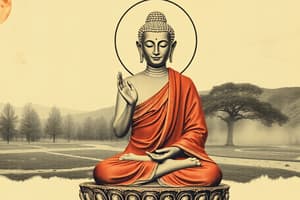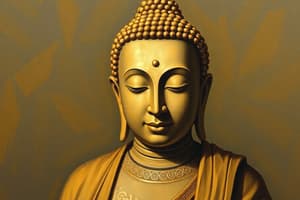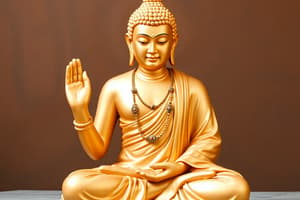Podcast
Questions and Answers
Who is the founder of Buddhism?
Who is the founder of Buddhism?
Siddhartha Gautama
What does the name 'Buddha' mean?
What does the name 'Buddha' mean?
Enlightened One
What are the Four Noble Truths?
What are the Four Noble Truths?
The four central beliefs containing the core of Buddhist teaching
What is the Eightfold Path?
What is the Eightfold Path?
What is Nirvana?
What is Nirvana?
What is the Tripitaka?
What is the Tripitaka?
Which of the following is a sect of Buddhism that is close to Buddha's original teachings?
Which of the following is a sect of Buddhism that is close to Buddha's original teachings?
In which regions is Mahayana Buddhism primarily practiced?
In which regions is Mahayana Buddhism primarily practiced?
Only monks and nuns can attain Nirvana in Theravada Buddhism.
Only monks and nuns can attain Nirvana in Theravada Buddhism.
Match the two sects of Buddhism with their characteristics:
Match the two sects of Buddhism with their characteristics:
Flashcards are hidden until you start studying
Study Notes
Buddhism Origin Story
- Siddhartha Gautama is the founder of Buddhism, known for gaining insights into suffering and its cessation.
- Gautama became known as the Buddha, which means "Enlightened One."
- The Four Noble Truths represent the foundation of Buddhist teachings, addressing the nature of suffering and its liberation.
Teachings of Buddhism
- The Eightfold Path serves as Buddha's guide to end suffering and achieve Nirvana.
- Nirvana signifies a state of union with the universe and liberation from the cycle of reincarnation.
- Key aspects of the Eightfold Path include:
- Right Insight
- Right Intention
- Right Speech
- Right Action
- Right Livelihood
- Right Effort
- Right Mindfulness
- Right Meditation
- Buddha's teachings rejected the Hindu varna system, promoting Dharma, the practice of Buddhism.
Spread of Buddhism
- Buddhism originated in India and expanded through the establishment of monasteries and convents for meditation and study.
- The Tripitaka serves as the primary sacred text, containing the teachings of Buddha.
- Missionaries and traders played a crucial role in spreading Buddhism to Asia.
Split of Buddhism
- Buddhism divides into two main sects:
- Theravada Buddhism: Closely aligns with Buddha's original teachings, emphasizing that only monks and nuns can attain Nirvana; prevalent in Sri Lanka and Southeast Asia.
- Mahayana Buddhism: More accessible to laypeople, allowing anyone to attain Nirvana; predominant in China, Tibet, Korea, and Japan.
Fourth Largest Religion
- Buddhism is one of the world's largest religions.
- Hotei, the Laughing Buddha, symbolizes luck and good fortune, based on a monk from the Liang Dynasty era.
Studying That Suits You
Use AI to generate personalized quizzes and flashcards to suit your learning preferences.




